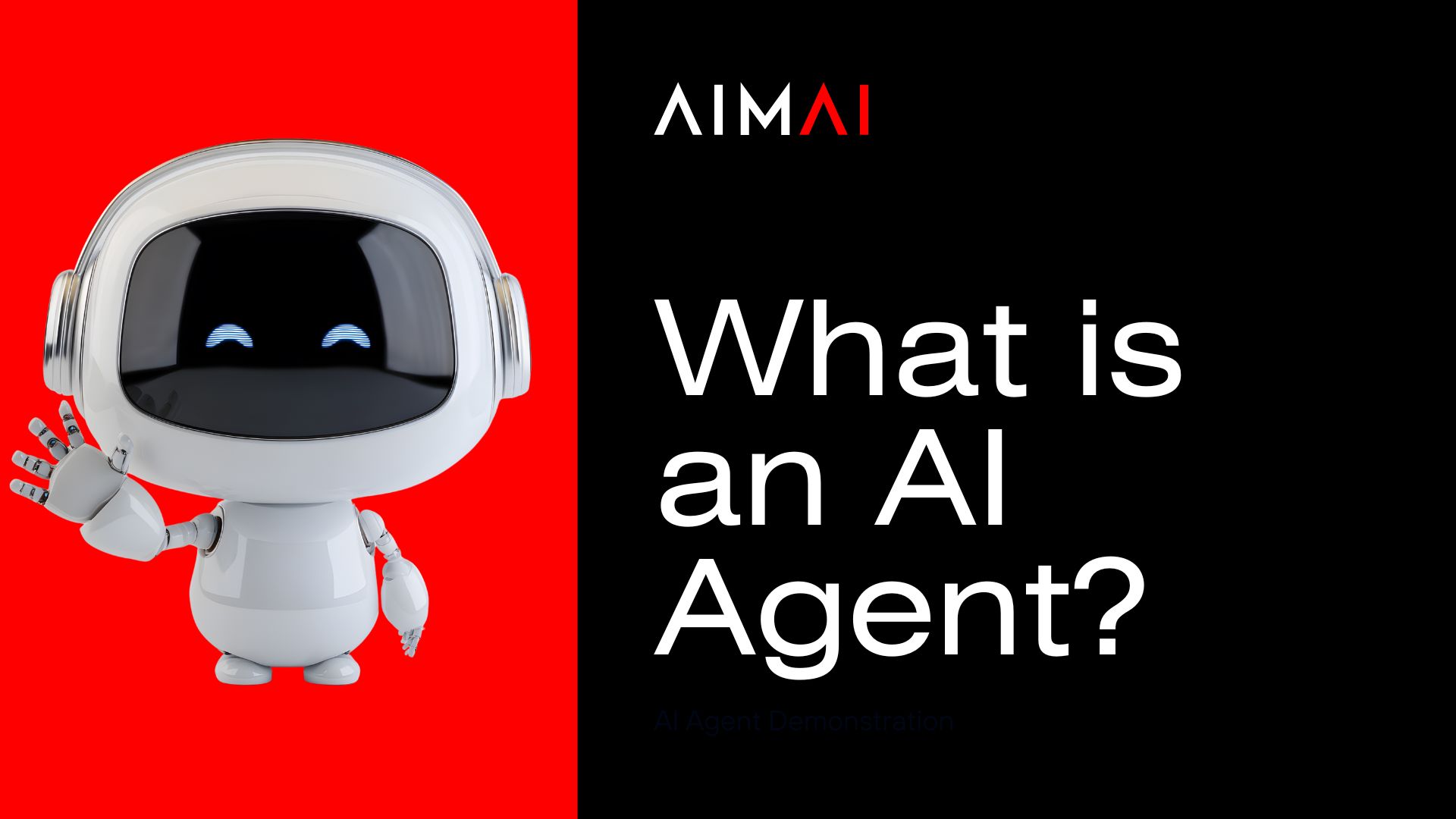And why are custom agents so useful?
Quick take:
An AI agent is software that can decide and act.
It plans. It reasons. It uses tools.
It gets things done without constant prompts.
What Is an AI Agent in Simple Terms
An AI agent takes a goal and works toward it.
It breaks work into steps.
It checks results as it goes.
It can use apps and data.
It can talk to other agents.
It can ask a person to confirm key actions.
What Is an AI Agent for Your Business
A custom AI agent is built for your workflow.
It understands your rules.
It connects to your systems.
It speaks your tone.
It keeps a record of every action.
Think of it like this:
- Goal aware. You set the outcome. The agent plans the route.
- Tool ready. It works with your CRM, your docs, your data.
- Reasoned steps. It thinks, acts, checks, and adapts.
- Memory. It learns from each run and improves over time.
- Control. You can stop it, review it, and fine tune it.
Why This Matters
- No learning curve. It mirrors the way your team already works.
- Speed and consistency. Tasks finish faster and quality stays high.
- Fit. The process adapts to you, not the other way around.
- Scale. Clone agents, combine agents, extend agents.
- Governance. Logs and reviews build trust and safety.
What Is an AI Agent vs a Chatbot
- Chatbots respond. Agents execute.
- Chatbots answer a question. Agents complete a task.
- Chatbots recall little. Agents remember and improve.
In Summary
What is an AI agent?
It is a digital teammate that takes action.
A custom AI agent is that teammate built for your systems.
It makes work simpler.
It makes outcomes predictable.
How Custom AI Agents Work
Quick take:
Custom AI agents work by combining goals, reasoning, tools, and memory.
They use logic to plan.
They use integrations to act.
They use feedback to improve.
The Four Layers of an AI Agent
1. Goal and context
Every agent starts with a goal.
You define what success looks like.
You define where it operates and what it can access.
This gives it focus and safe boundaries.
2. Reasoning and planning
The agent breaks the goal into smaller steps.
It decides the best order.
It can adjust as conditions change.
This is how it turns big goals into small wins.
3. Tool and system access
Custom AI agents connect to your systems.
They can pull data from a CRM, update spreadsheets, send emails, or post reports.
They act through APIs, not human clicks.
They get work done inside the tools you already use.
4. Memory and feedback
Each action is logged.
Each run teaches the agent what works and what doesn’t.
It learns from results.
It builds accuracy and confidence over time.
How an AI Agent Decides What to Do
When a task starts, the agent follows a simple loop:
- Understand the goal.
- Plan the steps.
- Use the right tools.
- Check the output.
- Improve next time.
This loop repeats until the job is complete.
No waiting for prompts.
No manual chasing.
Just intelligent, continuous progress.
The Human Connection
Even the smartest agent needs a human in the loop.
You control its scope.
You approve key actions.
You stop or adjust it when needed.
That balance keeps automation efficient and safe.
Why Custom AI Agents Matter
Quick take:
AI agents are not just about speed.
They are about focus, quality, and scale.
They make complex work simple and repeatable.
The Real Value of Custom AI Agents
Generic AI tools are built for anyone.
Custom AI agents are built for you.
They work the way your business works.
They fit your data, your tone, and your workflow.
They bring three big changes:
- Clarity. You see every step and every output.
- Control. You decide what it can do and where it can act.
- Consistency. It delivers the same standard every time.
The Core Benefits
1. Speed and accuracy
Custom AI agents handle repetitive or multi-step tasks faster than people can.
They never skip details or lose context.
2. Focused automation
They work inside your tools — not around them.
Email, CRM, spreadsheets, reports, creative systems.
All connected, all coordinated.
3. Always on
Agents don’t wait for reminders.
They run on triggers or schedules.
They deliver outputs while teams stay focused on higher-value work.
4. Smarter over time
Each run improves the next.
The agent learns from patterns, feedback, and outcomes.
You get continuous improvement, not just automation.
5. Safer scaling
Every action is logged.
Every change is traceable.
You can audit, review, or roll back as needed.
What This Means in Practice
Sales: An agent drafts proposals, updates pipelines, and emails reports before your morning coffee.
Operations: It monitors data, flags issues, and alerts teams instantly.
Marketing: It prepares content, checks tone, and builds posts ready for review.
Finance: It pulls data, compares trends, and sends weekly summaries.
Every example shows the same pattern — repetitive work becomes automatic work.
AI Agent Examples and Use Cases
Quick take:
AI agents are not ideas for the future.
They are tools that work right now.
Each one focuses on a real task that takes time, repeats often, and drains attention.
1. The Sales Agent
A sales agent connects to your CRM.
It pulls lead data, tracks movement, and prepares next steps.
It can draft proposals, send follow-up emails, or log activity.
The sales team stays focused on people — the agent handles the admin.
Result:
More pipeline movement.
Cleaner data.
Less repetition.
2. The Reporting Agent
Every business tracks numbers.
But collecting them takes hours.
A reporting agent gathers data from multiple tools, checks accuracy, and formats reports automatically.
It can email summaries, update dashboards, or brief your leadership team.
Result:
Consistent reports.
No manual spreadsheets.
Instant insight.
3. The Operations Agent
Operations teams depend on flow.
A custom AI agent can watch incoming data, check for errors, and trigger alerts when things go off track.
It can also create tasks or update schedules in project systems.
Result:
Fewer surprises.
Faster recovery.
Smoother delivery.
4. The Marketing Agent
This agent creates and coordinates content.
It can follow brand tone, check grammar, or build social posts from templates.
It can even suggest timing and formats based on engagement data.
Result:
Consistent voice.
Faster turnaround.
More time for creative thinking.
5. The Support Agent
Support never stops.
A service agent can read tickets, group similar issues, and draft replies.
It can flag urgent cases or escalate them automatically.
Result:
Shorter response times.
Better prioritisation.
Happier customers.
The Pattern Behind Every Example
Each AI agent:
- Knows the goal.
- Uses your data and systems.
- Acts with logic.
- Learns from outcomes.
Customisation makes them effective.
Your workflows shape their intelligence.
How to Build or Deploy Custom AI Agents
Quick take:
Building an AI agent starts with clarity.
You decide what it should do, how it should behave, and where it should connect.
Then you give it the tools to act.
Step 1: Define the Goal
Start simple.
What do you want the agent to achieve?
Think of one clear outcome — not a job title.
Examples:
- “Send a daily sales summary.”
- “Prepare a client proposal from CRM data.”
- “Check project updates and alert managers.”
Keep the goal narrow and measurable.
That focus keeps the agent reliable.
Step 2: Map the Process
List the steps a human would take to do the same job.
Where do they look for data?
What tools do they use?
What checks do they make?
Each of these steps becomes part of the agent’s logic.
Step 3: Connect the Systems
Agents need access to your tools — safely and clearly.
Typical connections include:
- CRMs like HubSpot or Salesforce
- Spreadsheets and databases
- Email and chat systems
- File storage and reporting tools
Integrations let the agent act inside your existing stack, not outside it.
Step 4: Add Reasoning and Guardrails
This is where the agent’s intelligence comes in.
It uses logic to plan, reason, and make small decisions.
Guardrails make sure it stays within approved limits.
Examples:
- Only send emails to approved contacts.
- Require human review before publishing content.
- Stop execution if data looks incomplete.
Reasoning gives autonomy.
Guardrails give safety.
Step 5: Test in a Sandbox
Always start small.
Run the agent on test data or limited accounts.
Watch what it does.
Fix errors early.
Add logs so every step can be traced.
Testing builds trust before you scale.
Step 6: Deploy and Monitor
Once proven, deploy the agent in production.
Set clear triggers — schedule, manual start, or event-based.
Monitor its actions.
Review logs regularly.
Update instructions as your process evolves.
Custom AI agents are living systems.
They grow with your business.
Risks, Governance, and Best Practice
Quick take:
AI agents are powerful.
They can also make mistakes fast.
Good governance turns automation into reliability.
The Main Risks
1. Data exposure
Agents often connect to CRMs, emails, and shared files.
Without the right permissions, they could read or move data they shouldn’t.
2. Looping or runaway actions
If an agent doesn’t know when to stop, it can repeat the same step or flood systems with requests.
3. Decision drift
Agents can misinterpret goals or produce results that are logically correct but contextually wrong.
4. Dependency risk
If one connected tool fails or changes its API, the agent might stop working or send incomplete data.
5. Overconfidence
Humans can start trusting outputs too quickly.
Unchecked automation can lead to unnoticed errors.
Governance That Keeps You Safe
Activity logs
Record every action.
Know what the agent did, when, and why.
This helps you debug, audit, and learn.
Human oversight
Keep people in the loop for key approvals and reviews.
AI should support judgment, not replace it.
Access control
Limit what data and tools the agent can reach.
Start with least privilege and expand only when proven safe.
Sandbox testing
Run all new logic or connections in a test environment first.
Catch surprises early.
Version tracking
When you update instructions, save versions.
You can roll back or compare behaviour over time.
Best Practice for Reliable AI Agents
- Start with clear goals and small scopes.
- Log everything.
- Keep humans in charge of final actions.
- Review agent performance regularly.
- Improve in controlled increments.
Governance is not about slowing down.
It’s about building trust at scale.
The Future of Custom AI Agents
Quick take:
The next wave of AI is not about bigger models.
It is about smarter connections.
Custom AI agents are the bridge between intelligence and real work.
From Apps to Agents
Most AI today lives inside single apps.
You log in, type a prompt, and wait for a result.
That model is changing.
In the future, AI agents will move across tools, teams, and systems.
They will act on live data.
They will talk to other agents.
They will get better with every project they complete.
From One Agent to Many
Businesses won’t rely on one large agent.
They will build networks of smaller ones — each trained for a single job.
One monitors data.
One reports performance.
One manages outreach.
These agents will collaborate, hand tasks to each other, and coordinate through shared goals.
The result: smooth, autonomous operations that stay human-guided but machine-powered.
From Automation to Adaptation
The next phase is not about replacing people.
It is about creating digital teammates that adapt to the way each team works.
Custom AI agents will blend into every process quietly — like reliable background systems.
They will not ask for prompts.
They will know what to do next.
And they will do it safely, transparently, and fast.
What It Means for Business
- Less friction. Processes that once took hours will take minutes.
- More clarity. Workflows will become visible, logged, and measurable.
- Greater resilience. AI agents can scale up instantly when demand spikes.
- Continuous improvement. Every run teaches the system to work better.
Start Building Your Own Custom AI Agent
If you want to see how custom AI agents could work inside your business, start with a quick chat.
At AIMAI, we help teams adopt AI the right way – through simple, secure, and practical implementation.
We build custom agents that fit your workflows, connect to your tools, and deliver real results fast.
You can:
- Book a video call: Schedule a chat
- Email us: info@aimai.co.uk
- Call us: 01484 767892
- Learn more: aimai.co.uk
- Try a live custom agent: app.aimai.co.uk
See what a tailored AI agent can do for your business – and how effortless real progress can feel.


